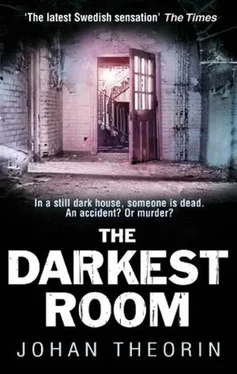Gerlof spread the top out on the table, and Tilda saw that the hood was torn. Something sharp had ripped two inch-long holes in the gray fabric.
Often when Joakim looked out of the kitchen window in the evening, he would see Rasputin slinking off to go hunting. But sometimes he thought he caught a glimpse of other black shapes moving out there-sometimes on four legs, sometimes on two.
Ethel?
The first few times, Joakim had hurried out onto the veranda steps to get a better look, but the inner courtyard had always been empty.
The shadows lengthened around Eel Point with every evening, and Joakim felt that the sense of unease in the house was also increasing as Christmas approached. The howling of the wind rose and fell around the eaves, and there was a constant tapping and creaking in the house.
If there were some unseen visitor at the manor, it wasn’t Katrine, he knew that. She was still keeping herself from him.
“I’ve brought the clothes back,” said Gerlof, handing over the brown package to Joakim on the other side of the table.
“Did you get anything out of them?”
“Perhaps.”
“But you don’t want to tell me what it was?”
“Soon,” said Gerlof. “When I’ve finished thinking.”
Joakim had never visited an old people’s home, as far as he remembered. Both sets of grandparents had remained at home until a ripe old age, and had spent their final days in the hospital. But he was sitting here now, drinking coffee in silence in Gerlof Davidsson’s room at the home at Marnäs. A candleholder with two lit Advent candles was the only sign that Christmas was coming.
A series of old objects hung on the walls: ships’ name-plates, framed ships’ certificates, and black-and-white photographs of two-masted sailing ships.
“Those are pictures of my cargo ships,” said Gerlof. “I had three different ones.”
“Are any of them still around?”
“Just one. She’s at a sailing club down in Karlskrona. The other two are gone… one of them burned, the other sank.”
Joakim looked down at the package of Katrine’s clothes, then looked out of the only window in the room. Twilight was already starting to fall.
“I have to pick up my children in an hour,” he said. “Can we talk for a while?”
“Of course,” said Gerlof. “The only thing on my schedule this afternoon was a talk on incontinence in the dayroom. It wasn’t all that appealing.”
For a long time Joakim had wanted to talk to someone about what had happened in the fall, someone who knew Eel Point. The pastor at the church in Marnäs seemed to have such rigid views, and Mirja Rambe thought too much about herself.
It was only when Gerlof Davidsson came out to the house and proved himself to be a good listener that he thought he might have found the right person. A kind of father confessor.
“I never asked you when you came out to the house, but… do you believe in ghosts?”
Gerlof shook his head. “I neither believe nor don’t believe,” he said. “I do collect ghost stories, but not in order to prove anything. And of course there are so many theories about ghosts… that they are part of the framework of old houses, or electromagnetic radiation.”
“Or just patches on the cornea,” said Joakim.
“Exactly,” said Gerlof. He was silent for a few seconds, then went on: “Of course, I could tell you a story I’ve never written about in any folk history book, but it’s the only real ghostly experience I’ve had.”
Joakim nodded.
“I took over my first cargo ship when I was seventeen,” said Gerlof. “I’d been at sea for a couple of years before that, saving up, and my father helped out with the finances. I knew exactly which ship I wanted to buy, a single-masted sailing ship with an engine; she was called Ingrid Maria , and her home port was Borgholm. The owner, Gerhard Marten, was in his sixties and had sailed cargo ships all his life. But then he developed heart problems and his doctor told him he couldn’t go to sea anymore. Ingrid Maria was for sale, and the price was three thousand five hundred kronor.”
“That was cheap, wasn’t it?” said Joakim.
“Yes, that was a good price even then,” said Gerlof, and continued: “The evening I was due to go and hand over the money to Marten, I took a walk down to the harbor to have a look at her. It was April, and the ice had just disappeared from the sound. The sun was going down, and there was hardly anybody around in the harbor… the only person I saw was old Gerhard. He was walking around on the deck of the Ingrid Maria , as if he was finding it difficult to part with her, and I went aboard. I don’t remember what we talked
about, but I took a short walk around the deck with him, and he pointed out a few little things that would need repairing. Then he told me to look after her, and we parted company. I went ashore and walked home to my parents’ house to have dinner and pick up the envelope containing the money.”
Gerlof fell silent, looking at the pictures of the cargo ships on the wall.
“At about seven o’clock I cycled over to the Marten family cottage north of Borgholm,” he went on. “But I arrived to find a house in mourning. Marten’s wife was there, her eyes red with weeping. Gerhard Marten was dead, it turned out. He had signed the purchase agreement the night before, then walked down to the shore early in the morning with his shotgun, and shot himself in the head.”
“In the morning?” said Joakim.
“That same morning, yes. So when I met Gerhard Marten down in the harbor, he had actually been dead for many hours. I can’t explain it… but I know that I met him that evening. We even shook hands.”
“So you met a ghost,” said Joakim.
Gerlof looked at him.
“Perhaps. But it doesn’t prove anything. It certainly doesn’t prove that there’s life after death.”
Joakim shifted in his seat and looked down at the parcel of clothes.
“I’m worried about my daughter, Livia,” he said. “She’s six years old, and she talks in her sleep. She always has done… but since my wife died she’s started to dream about her.”
“Is that so strange?” said Gerlof. “I dream about my late wife sometimes, and she’s been dead for many years.”
“Yes… but it’s the same dream, over and over again. Livia dreams that her mother comes to Eel Point, but can’t get into the house.”
Gerlof listened in silence.
“And sometimes she dreams about Ethel too,” Joakim went on. “That’s what worries me the most.”
“Who’s Ethel?” asked Gerlof.
“She was my sister. She was three years older than me.” Joakim sighed. “That’s my own ghost story. Kind of.”
“Tell me about her,” said Gerlof quietly.
Joakim nodded wearily. It was time.
“Ethel was a drug addict,” he said. “She died one winter’s night close to where we lived… two weeks before Christmas, a year ago.”
“I’m sorry,” said Gerlof.
“Thank you,” said Joakim, and went on: “I lied to you when I saw you last time… when you asked why we’d sold the house in Bromma and moved here. It had a lot to do with what happened to my sister. Once Ethel was dead, we didn’t want to stay in Stockholm.”
He stopped speaking again. He wanted to talk about this, and yet he didn’t want to. He didn’t really want to remember Ethel and her death. Nor Katrine’s long depression.
“But you miss your sister?” said Gerlof.
Joakim thought about it.
“A little.” That sounded terrible, so he added, “I miss her the way she used to be before… before the drugs. Ethel used to talk a lot, she always had so many plans. She was going to open a hair salon, she was going to be a music teacher… but after a while you just got so tired of it all, because none of the plans involved giving up the drugs. It was like watching someone sitting in a burning house, planning a party in the middle of the flames.”
Читать дальше










